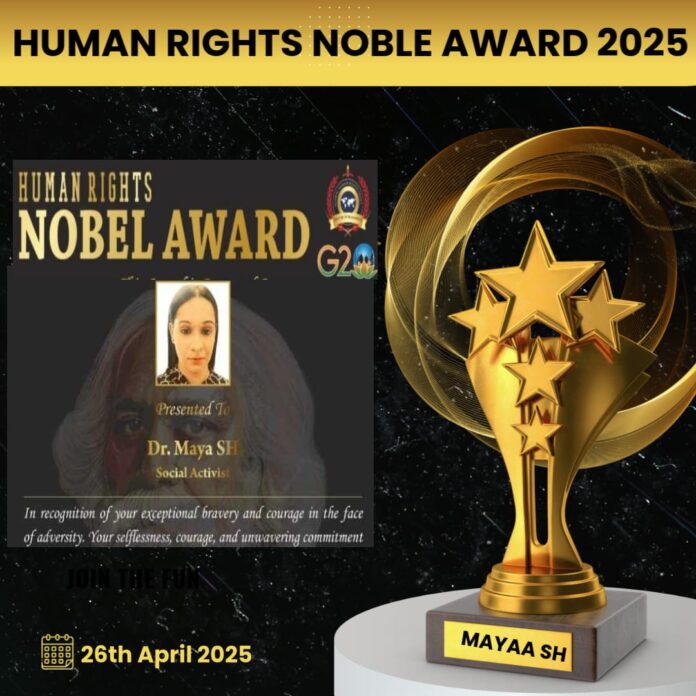Indian Noble Awardee Mayaa SH, a prominent advocate for women’s rights and empowerment, articulates a profound understanding of the necessity for women empowerment as a fundamental aspect of global human rights. She emphasizes that empowering women is not merely about achieving equality with men but involves a comprehensive transformation of societal norms and personal identities. This perspective is rooted in her belief that true liberation for women encompasses economic independence, access to education, healthcare, and political representation. Mayaa SH is an avid campaigner of gender equality and human rights, actively supporting various initiatives aimed at empowering women and addressing systemic inequalities. Her multifaceted approach encompasses education, legal reforms, mental health awareness, and community engagement. As an accomplished authoress with numerous publications Mayaa SH uses literature as a tool for advocacy and focus on women’s empowerment, her writings address critical social issues affecting women, including economic challenges, identity crises, and systemic discrimination. By sharing stories that resonate with many women’s experiences, she aims to inspire resilience and self-belief among her readers. Mayaa SH supports initiatives that promote gender equality through education reform, legal advocacy, mental health awareness campaigns, community engagement efforts, and impactful literature aimed at inspiring change.
“Human Rights Nobel Award 2025” ceremony was held in Maharashtra on April 26, 2025. The event honored Seema Kulkarni, a Marathi film actress, for her contributions to the industry. The award aims to recognize and celebrate individuals or organizations that have made outstanding contributions to the field of human rights, particularly those who have championed social justice and empowered marginalized communities. All are felicitated and bestowed with separate recognition of achievements in human rights and other fields to all those who excel on recognizing achievements in human rights and other areas.The “Human Rights Nobel Award” is the highest Honorary award, in the Memory of Shri Rabindranath Tagore, presented every year. The nominations of the award are typically based on the contributions of individuals, dignitaries or organizations towards peace, conflict resolution, and social justice.
“Human Rights Nobel Award 2025” awarded to Mayaa SH holds profound significance for the Mayaa and all people and indigenous communities worldwide. This is yet another accolade received by Mayaa SH has received the award for her efforts in advocating for the rights of indigenous peoples and promoting social justice. This award is not merely a personal accolade; it symbolizes recognition of the historical injustices faced by many indigenous populations where centuries of oppression and marginalization have occurred alongwith systemic discrimination, violence, and cultural erasure. For many individuals and communities, Mayaa’s receipt of this prestigious award acts as a source of empowerment. It demonstrates that their voices can be heard and valued globally. Her journey encourages others to advocate for their rights and seek justice against any kind of grievance. The recognition through the “Human Rights Nobel Award 2025” fosters solidarity among various indigenous groups worldwide who face similar challenges. It creates a platform for collaboration among different movements advocating for human rights, environmental justice, and social equity. This represents a significant milestone in acknowledging the struggles of many people, empowering them to continue their fight for justice while fostering pride in their cultural identity. The award serves as a reminder of the importance of human rights and the ongoing need to advocate for justice and equality for all. It also provides a platform for individuals and organizations working in the field of human rights to receive recognition and support.
In a candid interview, as an expert in suicide prevention and a social advisor on matrimonial law, the Firebrand Feminist Mayaa SH speaks on women empowerment and global human rights, initiatives that support global human rights and gender equality, advocacy for human rights connected with women’s rights….
What is your viewpoint on women empowerment and global human rights?
Women’s empowerment serves as a catalyst for broader societal change. When women are empowered, they can contribute meaningfully to their families and communities, thus fostering overall societal progress. Investments in women’s health and education are crucial drivers of economic development. By enabling women to participate fully in society, we can address systemic inequalities that hinder progress across various sectors.
The importance of challenging patriarchal structures that have historically oppressed women. “Feminism should be viewed as a struggle against these ideologies rather than simply a conflict between genders”. This involves advocating for changes in laws, policies, and cultural attitudes that perpetuate discrimination against women. By dismantling these barriers, society can create an environment where women can thrive without fear or limitation. Cultivating confidence in one’s abilities is essential for achieving true freedom. When women dare to dream and pursue their aspirations actively, they not only uplift themselves but also inspire others around them. This ripple effect can lead to significant social change as empowered women often become advocates for gender equality and social justice. The need to eliminate violence against women is imperative. Violence restricts women’s freedom and ability to participate fully in society. Addressing issues such as domestic violence and sexual harassment is fundamental to creating an environment where women can live freely and authentically. It is to be believed that the need for women empowerment is integral to advancing global human rights, emphasizing economic independence, education access, challenging patriarchal norms, fostering self-belief, and addressing violence against women as key components of this movement.
What according to you are top three initiatives that support global human rights and gender equality?
1) Education Initiatives :
One of the primary areas to focus on is education. I believes that empowering women through education is crucial for achieving gender equality. By promoting literacy and educational opportunities for girls and women, she aims to equip them with the knowledge and skills necessary to navigate societal challenges. This includes advocating for programs that enhance women’s access to quality education and vocational training, which are essential for economic independence and personal development.
2) Legal Reforms:
A lot of emphasis is to be laid on the importance of legal reforms in advancing women’s rights. Advocacy for gender-inclusive legislation that addresses the unique challenges faced by women in society is a must. This includes pushing for reforms in matrimonial laws to ensure that women’s rights are protected within marriage and divorce contexts. By highlighting the need for comprehensive understanding and implementation of these laws, the aim is to create a more equitable legal framework that supports women’s agency.
3) Mental Health Awareness:
Recognizing the intersection between mental health and gender equality, I assert to actively promote mental health awareness as part of my advocacy work. Addressal of issues such as depression, anxiety, and trauma that disproportionately affect women due to societal pressures and discrimination is the need of the hour. Through writings and public speaking engagements, open discussions about mental health, aiming to destigmatize these issues while providing resources for support must be encouraged.
Why is advocacy for human rights connected with women’s rights a must?
Advocacy not only seeks to change laws but also aims to empower women by raising awareness about their rights and providing them with tools to claim those rights. Grassroots movements have shown significant success in mobilizing communities around issues like reproductive health access and combating gender-based violence. By connecting women’s rights advocacy with broader human rights movements, a lot can leverage greater support and resources. “Advocacy for human rights is intrinsically connected with women’s rights because women’s rights are fundamentally human rights”. This connection is essential for several reasons.The foundation of human rights is built on the principle that all individuals are entitled to certain inalienable rights simply by virtue of being human. The 1948 Universal Declaration of Human Rights states that all humans are “born free and equal in dignity and rights,” which includes women and girls. However, despite this universal recognition, women continue to face systemic discrimination and violence globally, highlighting the need for targeted advocacy that addresses these specific injustices. Gender inequality manifests in various forms, including domestic violence, sexual harassment, unequal pay, and lack of access to education and healthcare. These issues
disproportionately affect women and girls, making it imperative that advocacy efforts focus on dismantling the structures that perpetuate gender-based discrimination For instance, statistics show that approximately 30% of women worldwide have experienced physical or sexual violence from an intimate partner at some point in their lives. Such violence is not just a personal issue but a violation of fundamental human rights.Advocacy for women’s rights must also consider intersectionality—the idea that various forms of discrimination (based on race, class, sexuality, etc.) overlap and compound the challenges faced by women. This understanding allows advocates to address the unique experiences of marginalized groups within the broader context of human rights. For example, women who belong to racial or ethnic minorities may face additional barriers in accessing healthcare or legal protections compared to their counterparts. Advocacy for human rights must include a strong focus on women’s rights because they are interconnected; addressing one without the other undermines efforts toward achieving true equality and justice for all individuals.
“Women’s rights are fundamentally human rights, and their intersection with broader human rights issues is critical to understanding the full scope of inequality and discrimination faced by women globally. This intersectionality highlights how various forms of oppression such as those based on race, class, orientation, and gender identity compound the challenges that women face. Women’s rights are deeply interconnected with broader human rights issues, encompassing historical struggles for equality across various domains. Understanding this intersectionality is crucial for developing effective advocacy strategies that address the unique challenges faced by different groups of women worldwide. By recognizing how multiple forms of discrimination interact with one another, advocates can work towards more inclusive solutions that promote justice for all…”
Mayaa SH advocates for human rights through literary contributions that amplify women’s voices, public speaking engagements that address pressing social issues, collaborations with organizations aimed at supporting vulnerable populations, educational initiatives that empower women through knowledge, and leveraging recognition from awards to inspire further advocacy efforts.
About The Author:
Mayaa SH is a prominent advocate for human rights, particularly focusing on women’s rights and empowerment. Her advocacy efforts are multifaceted and deeply rooted in her literary work, activism, and personal experiences. Mayaa SH utilizes her extensive literary output to highlight issues of gender inequality, violence against women, and mental health awareness. With over two hundred fifty plus anthologies contributions as a co author and fourteen solo books, her writings serve as a platform for marginalized voices, particularly those of women facing economic challenges and social struggles. By sharing real stories through her literature, she raises awareness about the systemic barriers that women encounter in society.
Contribution of Mayaa SH to Global Human Rights:
Mayaa SH is a prominent advocate for human rights, particularly focusing on women’s empowerment and social justice. Her contributions are multifaceted and span various domains, including literature, activism, and legal reform.
1) Advocacy for Women’s Rights:
Mayaa SH has dedicated her career to advocating for the rights of women, emphasizing the importance of gender equality as a fundamental human right. She actively campaigns against gender-based violence and discrimination, working to create awareness about these issues both in India and globally. Through her writings and public engagements, she highlights the challenges faced by women in marginalized communities and calls for systemic changes to address these injustices. Mayaa SH is a staunch advocate for women’s empowerment and gender equality. She emphasizes the importance of creating environments where women can thrive and contribute meaningfully to society. Her writings reflect a commitment to addressing systemic issues such as gender-based violence, economic inequality, and societal norms that perpetuate discrimination against women. By highlighting these issues through her literature and public speaking engagements, she has raised awareness on a global scale about the challenges faced by women in various cultural contexts.
2) Educational Initiatives:
Education is a cornerstone of Mayaa SH’s approach to human rights advocacy. She believes that empowering women through education is essential for achieving social change. By promoting educational initiatives that focus on women’s rights and legal literacy, she helps women understand their rights and navigate legal systems effectively. This educational focus not only uplifts individual women but also contributes to broader societal transformation.
3) Literary Contributions:
As an accomplished author with numerous publications, Mayaa SH uses literature as a tool for social change. Her works often address critical issues related to gender inequality, mental health, and social justice. By sharing stories that resonate with many individuals, she inspires readers to engage with human rights issues actively. Her literary efforts serve as both a reflection of societal challenges and a call to action for change.
4) International Recognition and Awards:
Mayaa SH’s work has garnered international recognition through various awards that celebrate her contributions to human rights advocacy. For instance, she received numerous awards at the international, national and state level which acknowledges individuals who have made significant impacts in their fields while promoting social justice. Such accolades not only validate her efforts but also amplify her voice on global platforms.
5) Engagement and Influence on Policy Dialogues:
Mayaa SH’s insights into the intersectionality of gender identity, patriarchy, and power dynamics have been instrumental in shaping policy discussions aimed at improving women’s safety and rights. Mayaa SH advocates for comprehensive legal frameworks that protect women from violence and discrimination while promoting their rights within the socio-economic landscape. This advocacy aligns with broader international human rights frameworks such as the United Nations’ Sustainable Development Goals (SDGs), particularly Goal 5: Achieve gender equality and empower all women and girls. Mayaa SH participates in international seminars and conferences focused on human rights issues, where she shares insights based on her experiences in India. These engagements allow her to connect with other activists worldwide, fostering collaboration and exchange of ideas aimed at advancing human rights globally.
In summary, Mayaa SH contributes globally to human rights through her advocacy for women’s empowerment, educational initiatives aimed at legal literacy, impactful literary works addressing social issues, recognition through prestigious awards, and active participation in global dialogues on human rights. Mayaa SH collaborates with various organizations dedicated to advancing human rights policies globally. These partnerships enhance her ability to effect change by combining resources, expertise, and networks aimed at addressing complex social issues. Through these collaborations, she contributes to developing strategies that promote inclusive justice systems responsive to the needs of marginalized groups. Her impact on global human rights policies is profound, driven by her unwavering commitment to advocating for women’s empowerment, influencing policy dialogues, engaging in educational initiatives, gaining international recognition, and collaborating with various organizations dedicated to social justice. Mayaa engages with various communities through events. These engagements allow her to directly address critical issues affecting women today, such as domestic violence and mental health challenges. She emphasizes the importance of self-belief among women, encouraging them to reclaim their narratives and assert their rights.





















